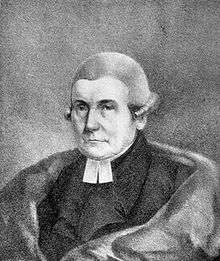Karl Ludwig Nitzsch

Karl Ludwig Nitzsch (6 August 1751, Wittenberg – 5 December 1831, Wittenberg) was a German theologian, a professor of theology since 1790.
From 1770 to 1775 he studied in Wittenberg, and later served as a pastor in the towns of Beucha (from 1781) and Borna (from 1785). In 1788 he became a superintendent and consistorial assessor in Zeitz. In 1790 he obtained his doctorate in theology and during the same year became a professor at the University of Wittenberg.[1] He was married to Louise Wernsdorf, the daughter of German rhetorician Johann Christian Wernsdorf.
Like his son, the better-known Karl Immanuel Nitzsch, he earned some distinction in the theological world by a number of writings, including a work entitled De discrimine revelationis imperaboriae et didacticae prolusiones academicae (2 volumes, 1830). Theologically, he represented a combination of supernaturalism and rationalism (supernatural rationalism or a Kantian rational supernaturalism).[2]
In addition to the aforementioned work, he was the author of:
- Ueber das Heil der Welt, 1817 – On salvation of the world.
- Ueber das Heil der Kirche, 1821 – On salvation of the church.
- Ueber das Heil der Theologie 1830 – On salvation of theology.[1]
See also
References
- 1 2 Nitzsch, Karl Ludwig at Deutsche Biographie
- ↑ The Encyclopaedia Britannica: A Dictionary of Arts, Sciences ..., Volume 19 edited by Hugh Chisholm